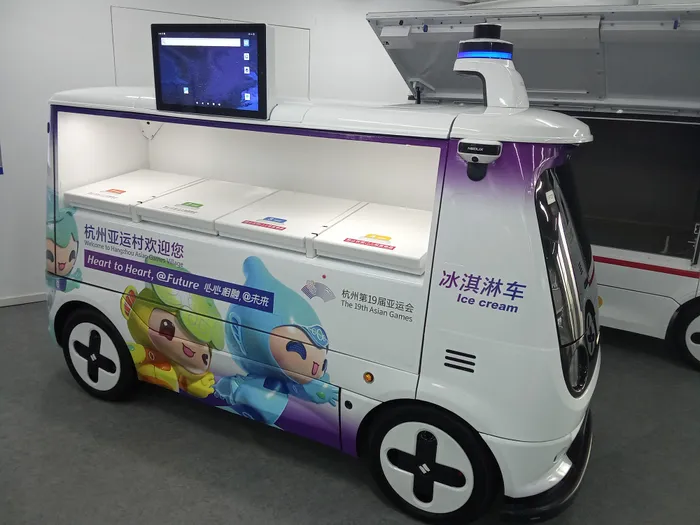Revolutionising logistics: technology’s impact through China and beyond

The X3 and X6 self driving autonmous vehicles produced by Neolix in Beijing, China. The vehicles provide courier services and sell products in various parts of the city. I Supplied
In one of our seminars on the impact of technology on industries all over the world, one of the main points of robust debate was how technology has had an impact on the media, transport, agriculture, manufacturing, engineering, mining and many other sectors.
The seminar, which included participation from media practitioners from all over the world explored the pros and cons of the fast changing world around us.
As someone in the media, one can see the positive changes, for example, technology has made the production and dissemination of news as a commodity much easier and accessible.
If you are a news junky then the current age of social media, e-readers, and online platforms and super apps will leave you on a natural high as you are spoiled for choice.

On the flip side, newspapers still have a critical role to play from a cultural and historical perspective, largely because a newspaper is still by far the most trusted news platform that the digital age piggybacks off of.
The process that a newspaper follows from the beginning to the finished product is rigorous and ticks all the fact checking boxes which means that the migration of print to digital needs to adopt an approach of online / digital first with print characteristics.
However, I digress, as the media is not the only industry that is seeing change as a result of the technological boom over the past 25 years or so.
As mentioned earlier, technological advancement has revolutionised industries such as transport, engineering, agriculture, energy, education and manufacturing sectors across the world with the most mesmerizing changes coming from China's mainland in areas such as the Fengtai district and its plethora of technology companies that resembles Silicon Valley and scenes from futuristic sci-fi movies.

From self-driving cars, automated services and autonomous delivery vehicles to driverless trains, and super app developers, along with organisations such as LL Vision which specialises in AI and Augmented Reality, the Fengtai District in Beijing is the heartbeat of China's technological pulse.
One such pioneering tech-company that grabbed my attention was Neolix, which has revolutionised autonomous logistics in China and is currently eyeing African market expansion.
Neolix, which specialises in the production of autonomous vehicles, is transforming the logistics industry with its self-driving delivery solutions.
In an interview with journalists from Africa, the company's CFO Li Ziyi shared insights on their cutting-edge technology, business model, and expansion plans.

With over 1 billion packages delivered daily in China, the country's logistics industry faces significant challenges and according to Ziyi, Neolix's autonomous vehicles aim to improve efficiency, reduce labour costs, and enhance road safety.
"Our technology empowers logistics companies to increase productivity and reduce accidents," said the Neolix representative. "We're committed to making autonomous delivery a reality in China and beyond," he explains.
The company generates an annual revenue: $28 million USD while its autonomous vehicles rely on advanced technologies such as sensor suites (lidar, cameras, radar), AI-powered navigation, 5G connectivity and battery-electric propulsion.
Ziyi explains that to operate effectively, Neolix requires massive data collection, 4G/5G networks and specialized road infrastructure.
Commenting on possible Africa expansion, Ziyi said Neolix is exploring opportunities in Africa, and, in the future, will look at leveraging cooperation agreements between Africa and China in science and technology.
Some of the key considerations that he highlighted for African market entry include understanding market needs and potential applications in each country and assessing technological and infrastructural readiness.
"We're interested in partnering with local companies and governments to adapt our technology to African markets. However, it's crucial to consider local market demands and infrastructure capabilities. Neolix envisions a future where autonomous vehicles transform the logistics industry. Autonomous delivery will revolutionise the way goods are transported, making it faster, safer, and more efficient," said Ziyi.
Neolix has received licenses to operate in over 70 cities across China and has partnered with major logistics companies. They are also exploring opportunities in 13 countries, including Japan, Switzerland, Italy, Singapore, Malaysia, Saudi Arabia, and Germany.

Ayanda Mdluli is the editor of the Daily News in South Africa
He is currently in China on Fellowship Programme with the China International Press Communication Center (CIPPC).
Daily News